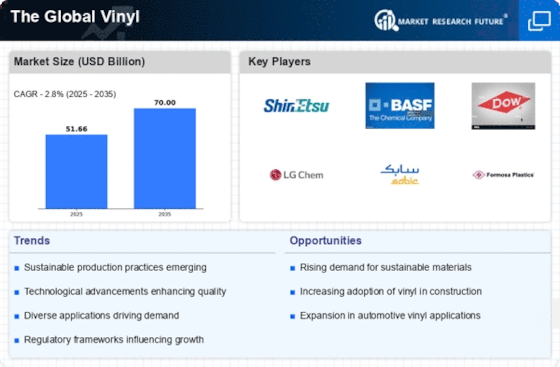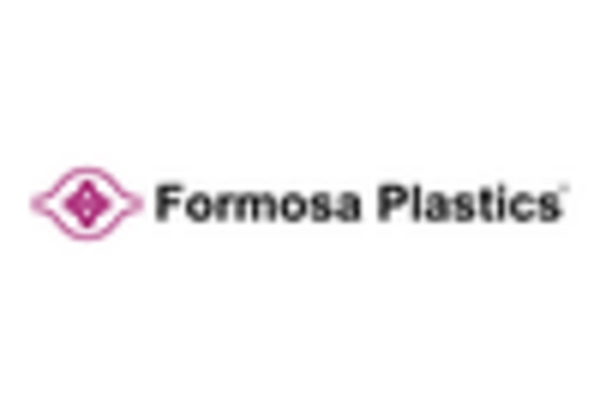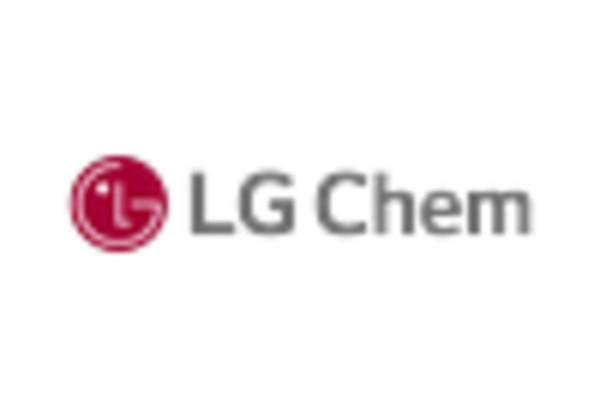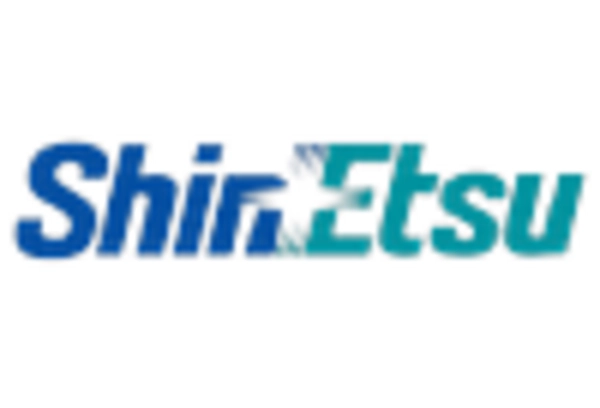-
EXECUTIVE SUMMARY
-
Market Overview
-
Key Findings
-
Market Segmentation
-
Competitive Landscape
-
Challenges and Opportunities
-
Future Outlook
-
MARKET INTRODUCTION
-
Definition
-
Scope of the study
- Research Objective
- Assumption
- Limitations
-
RESEARCH METHODOLOGY
-
Overview
-
Data Mining
-
Secondary Research
-
Primary Research
- Primary Interviews and Information Gathering Process
- Breakdown of Primary Respondents
-
Forecasting Model
-
Market Size Estimation
- Bottom-Up Approach
- Top-Down Approach
-
Data Triangulation
-
Validation
-
MARKET DYNAMICS
-
Overview
-
Drivers
-
Restraints
-
Opportunities
-
MARKET FACTOR ANALYSIS
-
Value chain Analysis
-
Porter's Five Forces Analysis
- Bargaining Power of Suppliers
- Bargaining Power of Buyers
- Threat of New Entrants
- Threat of Substitutes
- Intensity of Rivalry
-
COVID-19 Impact Analysis
- Market Impact Analysis
- Regional Impact
- Opportunity and Threat Analysis
-
VINYL MARKET, BY APPLICATION (USD BILLION)
-
Flooring
-
Wall Coverings
-
Automotive Interior
-
Medical Applications
-
Packaging
-
VINYL MARKET, BY PRODUCT TYPE (USD BILLION)
-
Vinyl Sheets
-
Vinyl Tiles
-
Vinyl Planks
-
Vinyl Films
-
Vinyl Coatings
-
VINYL MARKET, BY END USE (USD BILLION)
-
Residential
-
Commercial
-
Industrial
-
Automotive
-
Healthcare
-
VINYL MARKET, BY FORM (USD BILLION)
-
Rigid Vinyl
-
Flexible Vinyl
-
Foamed Vinyl
-
Composite Vinyl
-
VINYL MARKET, BY REGIONAL (USD BILLION)
-
North America
- US
- Canada
-
Europe
- Germany
- UK
- France
- Russia
- Italy
- Spain
- Rest of Europe
-
APAC
- China
- India
- Japan
- South Korea
- Malaysia
- Thailand
- Indonesia
- Rest of APAC
-
South America
- Brazil
- Mexico
- Argentina
- Rest of South America
-
MEA
- GCC Countries
- South Africa
- Rest of MEA
-
COMPETITIVE LANDSCAPE
-
Overview
-
Competitive Analysis
-
Market share Analysis
-
Major Growth Strategy in the Vinyl Market
-
Competitive Benchmarking
-
Leading Players in Terms of Number of Developments in the Vinyl Market
-
Key developments and growth strategies
- New Product Launch/Service Deployment
- Merger & Acquisitions
- Joint Ventures
-
Major Players Financial Matrix
- Sales and Operating Income
- Major Players R&D Expenditure. 2023
-
COMPANY PROFILES
-
INEOS
- Financial Overview
- Products Offered
- Key Developments
- SWOT Analysis
- Key Strategies
-
Solvay
- Financial Overview
- Products Offered
- Key Developments
- SWOT Analysis
- Key Strategies
-
ExxonMobil
- Financial Overview
- Products Offered
- Key Developments
- SWOT Analysis
- Key Strategies
-
Mitsubishi Chemical
- Financial Overview
- Products Offered
- Key Developments
- SWOT Analysis
- Key Strategies
-
SABIC
- Financial Overview
- Products Offered
- Key Developments
- SWOT Analysis
- Key Strategies
-
Eastman Chemical
- Financial Overview
- Products Offered
- Key Developments
- SWOT Analysis
- Key Strategies
-
Formosa Plastics
- Financial Overview
- Products Offered
- Key Developments
- SWOT Analysis
- Key Strategies
-
Kaneka
- Financial Overview
- Products Offered
- Key Developments
- SWOT Analysis
- Key Strategies
-
LyondellBasell
- Financial Overview
- Products Offered
- Key Developments
- SWOT Analysis
- Key Strategies
-
BASF
- Financial Overview
- Products Offered
- Key Developments
- SWOT Analysis
- Key Strategies
-
Dupont
- Financial Overview
- Products Offered
- Key Developments
- SWOT Analysis
- Key Strategies
-
ShinEtsu Chemical
- Financial Overview
- Products Offered
- Key Developments
- SWOT Analysis
- Key Strategies
-
Clariant
- Financial Overview
- Products Offered
- Key Developments
- SWOT Analysis
- Key Strategies
-
LG Chem
- Financial Overview
- Products Offered
- Key Developments
- SWOT Analysis
- Key Strategies
-
APPENDIX
-
References
-
Related Reports
-
LIST OF TABLES
-
LIST OF ASSUMPTIONS
-
NORTH AMERICA VINYL MARKET SIZE ESTIMATES & FORECAST, BY APPLICATION, 2019-2035 (USD BILLIONS)
-
NORTH AMERICA VINYL MARKET SIZE ESTIMATES & FORECAST, BY PRODUCT TYPE, 2019-2035 (USD BILLIONS)
-
NORTH AMERICA VINYL MARKET SIZE ESTIMATES & FORECAST, BY END USE, 2019-2035 (USD BILLIONS)
-
NORTH AMERICA VINYL MARKET SIZE ESTIMATES & FORECAST, BY FORM, 2019-2035 (USD BILLIONS)
-
NORTH AMERICA VINYL MARKET SIZE ESTIMATES & FORECAST, BY REGIONAL, 2019-2035 (USD BILLIONS)
-
US VINYL MARKET SIZE ESTIMATES & FORECAST, BY APPLICATION, 2019-2035 (USD BILLIONS)
-
US VINYL MARKET SIZE ESTIMATES & FORECAST, BY PRODUCT TYPE, 2019-2035 (USD BILLIONS)
-
US VINYL MARKET SIZE ESTIMATES & FORECAST, BY END USE, 2019-2035 (USD BILLIONS)
-
US VINYL MARKET SIZE ESTIMATES & FORECAST, BY FORM, 2019-2035 (USD BILLIONS)
-
US VINYL MARKET SIZE ESTIMATES & FORECAST, BY REGIONAL, 2019-2035 (USD BILLIONS)
-
CANADA VINYL MARKET SIZE ESTIMATES & FORECAST, BY APPLICATION, 2019-2035 (USD BILLIONS)
-
CANADA VINYL MARKET SIZE ESTIMATES & FORECAST, BY PRODUCT TYPE, 2019-2035 (USD BILLIONS)
-
CANADA VINYL MARKET SIZE ESTIMATES & FORECAST, BY END USE, 2019-2035 (USD BILLIONS)
-
CANADA VINYL MARKET SIZE ESTIMATES & FORECAST, BY FORM, 2019-2035 (USD BILLIONS)
-
CANADA VINYL MARKET SIZE ESTIMATES & FORECAST, BY REGIONAL, 2019-2035 (USD BILLIONS)
-
EUROPE VINYL MARKET SIZE ESTIMATES & FORECAST, BY APPLICATION, 2019-2035 (USD BILLIONS)
-
EUROPE VINYL MARKET SIZE ESTIMATES & FORECAST, BY PRODUCT TYPE, 2019-2035 (USD BILLIONS)
-
EUROPE VINYL MARKET SIZE ESTIMATES & FORECAST, BY END USE, 2019-2035 (USD BILLIONS)
-
EUROPE VINYL MARKET SIZE ESTIMATES & FORECAST, BY FORM, 2019-2035 (USD BILLIONS)
-
EUROPE VINYL MARKET SIZE ESTIMATES & FORECAST, BY REGIONAL, 2019-2035 (USD BILLIONS)
-
GERMANY VINYL MARKET SIZE ESTIMATES & FORECAST, BY APPLICATION, 2019-2035 (USD BILLIONS)
-
GERMANY VINYL MARKET SIZE ESTIMATES & FORECAST, BY PRODUCT TYPE, 2019-2035 (USD BILLIONS)
-
GERMANY VINYL MARKET SIZE ESTIMATES & FORECAST, BY END USE, 2019-2035 (USD BILLIONS)
-
GERMANY VINYL MARKET SIZE ESTIMATES & FORECAST, BY FORM, 2019-2035 (USD BILLIONS)
-
GERMANY VINYL MARKET SIZE ESTIMATES & FORECAST, BY REGIONAL, 2019-2035 (USD BILLIONS)
-
UK VINYL MARKET SIZE ESTIMATES & FORECAST, BY APPLICATION, 2019-2035 (USD BILLIONS)
-
UK VINYL MARKET SIZE ESTIMATES & FORECAST, BY PRODUCT TYPE, 2019-2035 (USD BILLIONS)
-
UK VINYL MARKET SIZE ESTIMATES & FORECAST, BY END USE, 2019-2035 (USD BILLIONS)
-
UK VINYL MARKET SIZE ESTIMATES & FORECAST, BY FORM, 2019-2035 (USD BILLIONS)
-
UK VINYL MARKET SIZE ESTIMATES & FORECAST, BY REGIONAL, 2019-2035 (USD BILLIONS)
-
FRANCE VINYL MARKET SIZE ESTIMATES & FORECAST, BY APPLICATION, 2019-2035 (USD BILLIONS)
-
FRANCE VINYL MARKET SIZE ESTIMATES & FORECAST, BY PRODUCT TYPE, 2019-2035 (USD BILLIONS)
-
FRANCE VINYL MARKET SIZE ESTIMATES & FORECAST, BY END USE, 2019-2035 (USD BILLIONS)
-
FRANCE VINYL MARKET SIZE ESTIMATES & FORECAST, BY FORM, 2019-2035 (USD BILLIONS)
-
FRANCE VINYL MARKET SIZE ESTIMATES & FORECAST, BY REGIONAL, 2019-2035 (USD BILLIONS)
-
RUSSIA VINYL MARKET SIZE ESTIMATES & FORECAST, BY APPLICATION, 2019-2035 (USD BILLIONS)
-
RUSSIA VINYL MARKET SIZE ESTIMATES & FORECAST, BY PRODUCT TYPE, 2019-2035 (USD BILLIONS)
-
RUSSIA VINYL MARKET SIZE ESTIMATES & FORECAST, BY END USE, 2019-2035 (USD BILLIONS)
-
RUSSIA VINYL MARKET SIZE ESTIMATES & FORECAST, BY FORM, 2019-2035 (USD BILLIONS)
-
RUSSIA VINYL MARKET SIZE ESTIMATES & FORECAST, BY REGIONAL, 2019-2035 (USD BILLIONS)
-
ITALY VINYL MARKET SIZE ESTIMATES & FORECAST, BY APPLICATION, 2019-2035 (USD BILLIONS)
-
ITALY VINYL MARKET SIZE ESTIMATES & FORECAST, BY PRODUCT TYPE, 2019-2035 (USD BILLIONS)
-
ITALY VINYL MARKET SIZE ESTIMATES & FORECAST, BY END USE, 2019-2035 (USD BILLIONS)
-
ITALY VINYL MARKET SIZE ESTIMATES & FORECAST, BY FORM, 2019-2035 (USD BILLIONS)
-
ITALY VINYL MARKET SIZE ESTIMATES & FORECAST, BY REGIONAL, 2019-2035 (USD BILLIONS)
-
SPAIN VINYL MARKET SIZE ESTIMATES & FORECAST, BY APPLICATION, 2019-2035 (USD BILLIONS)
-
SPAIN VINYL MARKET SIZE ESTIMATES & FORECAST, BY PRODUCT TYPE, 2019-2035 (USD BILLIONS)
-
SPAIN VINYL MARKET SIZE ESTIMATES & FORECAST, BY END USE, 2019-2035 (USD BILLIONS)
-
SPAIN VINYL MARKET SIZE ESTIMATES & FORECAST, BY FORM, 2019-2035 (USD BILLIONS)
-
SPAIN VINYL MARKET SIZE ESTIMATES & FORECAST, BY REGIONAL, 2019-2035 (USD BILLIONS)
-
REST OF EUROPE VINYL MARKET SIZE ESTIMATES & FORECAST, BY APPLICATION, 2019-2035 (USD BILLIONS)
-
REST OF EUROPE VINYL MARKET SIZE ESTIMATES & FORECAST, BY PRODUCT TYPE, 2019-2035 (USD BILLIONS)
-
REST OF EUROPE VINYL MARKET SIZE ESTIMATES & FORECAST, BY END USE, 2019-2035 (USD BILLIONS)
-
REST OF EUROPE VINYL MARKET SIZE ESTIMATES & FORECAST, BY FORM, 2019-2035 (USD BILLIONS)
-
REST OF EUROPE VINYL MARKET SIZE ESTIMATES & FORECAST, BY REGIONAL, 2019-2035 (USD BILLIONS)
-
APAC VINYL MARKET SIZE ESTIMATES & FORECAST, BY APPLICATION, 2019-2035 (USD BILLIONS)
-
APAC VINYL MARKET SIZE ESTIMATES & FORECAST, BY PRODUCT TYPE, 2019-2035 (USD BILLIONS)
-
APAC VINYL MARKET SIZE ESTIMATES & FORECAST, BY END USE, 2019-2035 (USD BILLIONS)
-
APAC VINYL MARKET SIZE ESTIMATES & FORECAST, BY FORM, 2019-2035 (USD BILLIONS)
-
APAC VINYL MARKET SIZE ESTIMATES & FORECAST, BY REGIONAL, 2019-2035 (USD BILLIONS)
-
CHINA VINYL MARKET SIZE ESTIMATES & FORECAST, BY APPLICATION, 2019-2035 (USD BILLIONS)
-
CHINA VINYL MARKET SIZE ESTIMATES & FORECAST, BY PRODUCT TYPE, 2019-2035 (USD BILLIONS)
-
CHINA VINYL MARKET SIZE ESTIMATES & FORECAST, BY END USE, 2019-2035 (USD BILLIONS)
-
CHINA VINYL MARKET SIZE ESTIMATES & FORECAST, BY FORM, 2019-2035 (USD BILLIONS)
-
CHINA VINYL MARKET SIZE ESTIMATES & FORECAST, BY REGIONAL, 2019-2035 (USD BILLIONS)
-
INDIA VINYL MARKET SIZE ESTIMATES & FORECAST, BY APPLICATION, 2019-2035 (USD BILLIONS)
-
INDIA VINYL MARKET SIZE ESTIMATES & FORECAST, BY PRODUCT TYPE, 2019-2035 (USD BILLIONS)
-
INDIA VINYL MARKET SIZE ESTIMATES & FORECAST, BY END USE, 2019-2035 (USD BILLIONS)
-
INDIA VINYL MARKET SIZE ESTIMATES & FORECAST, BY FORM, 2019-2035 (USD BILLIONS)
-
INDIA VINYL MARKET SIZE ESTIMATES & FORECAST, BY REGIONAL, 2019-2035 (USD BILLIONS)
-
JAPAN VINYL MARKET SIZE ESTIMATES & FORECAST, BY APPLICATION, 2019-2035 (USD BILLIONS)
-
JAPAN VINYL MARKET SIZE ESTIMATES & FORECAST, BY PRODUCT TYPE, 2019-2035 (USD BILLIONS)
-
JAPAN VINYL MARKET SIZE ESTIMATES & FORECAST, BY END USE, 2019-2035 (USD BILLIONS)
-
JAPAN VINYL MARKET SIZE ESTIMATES & FORECAST, BY FORM, 2019-2035 (USD BILLIONS)
-
JAPAN VINYL MARKET SIZE ESTIMATES & FORECAST, BY REGIONAL, 2019-2035 (USD BILLIONS)
-
SOUTH KOREA VINYL MARKET SIZE ESTIMATES & FORECAST, BY APPLICATION, 2019-2035 (USD BILLIONS)
-
SOUTH KOREA VINYL MARKET SIZE ESTIMATES & FORECAST, BY PRODUCT TYPE, 2019-2035 (USD BILLIONS)
-
SOUTH KOREA VINYL MARKET SIZE ESTIMATES & FORECAST, BY END USE, 2019-2035 (USD BILLIONS)
-
SOUTH KOREA VINYL MARKET SIZE ESTIMATES & FORECAST, BY FORM, 2019-2035 (USD BILLIONS)
-
SOUTH KOREA VINYL MARKET SIZE ESTIMATES & FORECAST, BY REGIONAL, 2019-2035 (USD BILLIONS)
-
MALAYSIA VINYL MARKET SIZE ESTIMATES & FORECAST, BY APPLICATION, 2019-2035 (USD BILLIONS)
-
MALAYSIA VINYL MARKET SIZE ESTIMATES & FORECAST, BY PRODUCT TYPE, 2019-2035 (USD BILLIONS)
-
MALAYSIA VINYL MARKET SIZE ESTIMATES & FORECAST, BY END USE, 2019-2035 (USD BILLIONS)
-
MALAYSIA VINYL MARKET SIZE ESTIMATES & FORECAST, BY FORM, 2019-2035 (USD BILLIONS)
-
MALAYSIA VINYL MARKET SIZE ESTIMATES & FORECAST, BY REGIONAL, 2019-2035 (USD BILLIONS)
-
THAILAND VINYL MARKET SIZE ESTIMATES & FORECAST, BY APPLICATION, 2019-2035 (USD BILLIONS)
-
THAILAND VINYL MARKET SIZE ESTIMATES & FORECAST, BY PRODUCT TYPE, 2019-2035 (USD BILLIONS)
-
THAILAND VINYL MARKET SIZE ESTIMATES & FORECAST, BY END USE, 2019-2035 (USD BILLIONS)
-
THAILAND VINYL MARKET SIZE ESTIMATES & FORECAST, BY FORM, 2019-2035 (USD BILLIONS)
-
THAILAND VINYL MARKET SIZE ESTIMATES & FORECAST, BY REGIONAL, 2019-2035 (USD BILLIONS)
-
INDONESIA VINYL MARKET SIZE ESTIMATES & FORECAST, BY APPLICATION, 2019-2035 (USD BILLIONS)
-
INDONESIA VINYL MARKET SIZE ESTIMATES & FORECAST, BY PRODUCT TYPE, 2019-2035 (USD BILLIONS)
-
INDONESIA VINYL MARKET SIZE ESTIMATES & FORECAST, BY END USE, 2019-2035 (USD BILLIONS)
-
INDONESIA VINYL MARKET SIZE ESTIMATES & FORECAST, BY FORM, 2019-2035 (USD BILLIONS)
-
INDONESIA VINYL MARKET SIZE ESTIMATES & FORECAST, BY REGIONAL, 2019-2035 (USD BILLIONS)
-
REST OF APAC VINYL MARKET SIZE ESTIMATES & FORECAST, BY APPLICATION, 2019-2035 (USD BILLIONS)
-
REST OF APAC VINYL MARKET SIZE ESTIMATES & FORECAST, BY PRODUCT TYPE, 2019-2035 (USD BILLIONS)
-
REST OF APAC VINYL MARKET SIZE ESTIMATES & FORECAST, BY END USE, 2019-2035 (USD BILLIONS)
-
REST OF APAC VINYL MARKET SIZE ESTIMATES & FORECAST, BY FORM, 2019-2035 (USD BILLIONS)
-
REST OF APAC VINYL MARKET SIZE ESTIMATES & FORECAST, BY REGIONAL, 2019-2035 (USD BILLIONS)
-
SOUTH AMERICA VINYL MARKET SIZE ESTIMATES & FORECAST, BY APPLICATION, 2019-2035 (USD BILLIONS)
-
SOUTH AMERICA VINYL MARKET SIZE ESTIMATES & FORECAST, BY PRODUCT TYPE, 2019-2035 (USD BILLIONS)
-
SOUTH AMERICA VINYL MARKET SIZE ESTIMATES & FORECAST, BY END USE, 2019-2035 (USD BILLIONS)
-
SOUTH AMERICA VINYL MARKET SIZE ESTIMATES & FORECAST, BY FORM, 2019-2035 (USD BILLIONS)
-
SOUTH AMERICA VINYL MARKET SIZE ESTIMATES & FORECAST, BY REGIONAL, 2019-2035 (USD BILLIONS)
-
BRAZIL VINYL MARKET SIZE ESTIMATES & FORECAST, BY APPLICATION, 2019-2035 (USD BILLIONS)
-
BRAZIL VINYL MARKET SIZE ESTIMATES & FORECAST, BY PRODUCT TYPE, 2019-2035 (USD BILLIONS)
-
BRAZIL VINYL MARKET SIZE ESTIMATES & FORECAST, BY END USE, 2019-2035 (USD BILLIONS)
-
BRAZIL VINYL MARKET SIZE ESTIMATES & FORECAST, BY FORM, 2019-2035 (USD BILLIONS)
-
BRAZIL VINYL MARKET SIZE ESTIMATES & FORECAST, BY REGIONAL, 2019-2035 (USD BILLIONS)
-
MEXICO VINYL MARKET SIZE ESTIMATES & FORECAST, BY APPLICATION, 2019-2035 (USD BILLIONS)
-
MEXICO VINYL MARKET SIZE ESTIMATES & FORECAST, BY PRODUCT TYPE, 2019-2035 (USD BILLIONS)
-
MEXICO VINYL MARKET SIZE ESTIMATES & FORECAST, BY END USE, 2019-2035 (USD BILLIONS)
-
MEXICO VINYL MARKET SIZE ESTIMATES & FORECAST, BY FORM, 2019-2035 (USD BILLIONS)
-
MEXICO VINYL MARKET SIZE ESTIMATES & FORECAST, BY REGIONAL, 2019-2035 (USD BILLIONS)
-
ARGENTINA VINYL MARKET SIZE ESTIMATES & FORECAST, BY APPLICATION, 2019-2035 (USD BILLIONS)
-
ARGENTINA VINYL MARKET SIZE ESTIMATES & FORECAST, BY PRODUCT TYPE, 2019-2035 (USD BILLIONS)
-
ARGENTINA VINYL MARKET SIZE ESTIMATES & FORECAST, BY END USE, 2019-2035 (USD BILLIONS)
-
ARGENTINA VINYL MARKET SIZE ESTIMATES & FORECAST, BY FORM, 2019-2035 (USD BILLIONS)
-
ARGENTINA VINYL MARKET SIZE ESTIMATES & FORECAST, BY REGIONAL, 2019-2035 (USD BILLIONS)
-
REST OF SOUTH AMERICA VINYL MARKET SIZE ESTIMATES & FORECAST, BY APPLICATION, 2019-2035 (USD BILLIONS)
-
REST OF SOUTH AMERICA VINYL MARKET SIZE ESTIMATES & FORECAST, BY PRODUCT TYPE, 2019-2035 (USD BILLIONS)
-
REST OF SOUTH AMERICA VINYL MARKET SIZE ESTIMATES & FORECAST, BY END USE, 2019-2035 (USD BILLIONS)
-
REST OF SOUTH AMERICA VINYL MARKET SIZE ESTIMATES & FORECAST, BY FORM, 2019-2035 (USD BILLIONS)
-
REST OF SOUTH AMERICA VINYL MARKET SIZE ESTIMATES & FORECAST, BY REGIONAL, 2019-2035 (USD BILLIONS)
-
MEA VINYL MARKET SIZE ESTIMATES & FORECAST, BY APPLICATION, 2019-2035 (USD BILLIONS)
-
MEA VINYL MARKET SIZE ESTIMATES & FORECAST, BY PRODUCT TYPE, 2019-2035 (USD BILLIONS)
-
MEA VINYL MARKET SIZE ESTIMATES & FORECAST, BY END USE, 2019-2035 (USD BILLIONS)
-
MEA VINYL MARKET SIZE ESTIMATES & FORECAST, BY FORM, 2019-2035 (USD BILLIONS)
-
MEA VINYL MARKET SIZE ESTIMATES & FORECAST, BY REGIONAL, 2019-2035 (USD BILLIONS)
-
GCC COUNTRIES VINYL MARKET SIZE ESTIMATES & FORECAST, BY APPLICATION, 2019-2035 (USD BILLIONS)
-
GCC COUNTRIES VINYL MARKET SIZE ESTIMATES & FORECAST, BY PRODUCT TYPE, 2019-2035 (USD BILLIONS)
-
GCC COUNTRIES VINYL MARKET SIZE ESTIMATES & FORECAST, BY END USE, 2019-2035 (USD BILLIONS)
-
GCC COUNTRIES VINYL MARKET SIZE ESTIMATES & FORECAST, BY FORM, 2019-2035 (USD BILLIONS)
-
GCC COUNTRIES VINYL MARKET SIZE ESTIMATES & FORECAST, BY REGIONAL, 2019-2035 (USD BILLIONS)
-
SOUTH AFRICA VINYL MARKET SIZE ESTIMATES & FORECAST, BY APPLICATION, 2019-2035 (USD BILLIONS)
-
SOUTH AFRICA VINYL MARKET SIZE ESTIMATES & FORECAST, BY PRODUCT TYPE, 2019-2035 (USD BILLIONS)
-
SOUTH AFRICA VINYL MARKET SIZE ESTIMATES & FORECAST, BY END USE, 2019-2035 (USD BILLIONS)
-
SOUTH AFRICA VINYL MARKET SIZE ESTIMATES & FORECAST, BY FORM, 2019-2035 (USD BILLIONS)
-
SOUTH AFRICA VINYL MARKET SIZE ESTIMATES & FORECAST, BY REGIONAL, 2019-2035 (USD BILLIONS)
-
REST OF MEA VINYL MARKET SIZE ESTIMATES & FORECAST, BY APPLICATION, 2019-2035 (USD BILLIONS)
-
REST OF MEA VINYL MARKET SIZE ESTIMATES & FORECAST, BY PRODUCT TYPE, 2019-2035 (USD BILLIONS)
-
REST OF MEA VINYL MARKET SIZE ESTIMATES & FORECAST, BY END USE, 2019-2035 (USD BILLIONS)
-
REST OF MEA VINYL MARKET SIZE ESTIMATES & FORECAST, BY FORM, 2019-2035 (USD BILLIONS)
-
REST OF MEA VINYL MARKET SIZE ESTIMATES & FORECAST, BY REGIONAL, 2019-2035 (USD BILLIONS)
-
PRODUCT LAUNCH/PRODUCT DEVELOPMENT/APPROVAL
-
ACQUISITION/PARTNERSHIP
-
LIST OF FIGURES
-
MARKET SYNOPSIS
-
NORTH AMERICA VINYL MARKET ANALYSIS
-
US VINYL MARKET ANALYSIS BY APPLICATION
-
US VINYL MARKET ANALYSIS BY PRODUCT TYPE
-
US VINYL MARKET ANALYSIS BY END USE
-
US VINYL MARKET ANALYSIS BY FORM
-
US VINYL MARKET ANALYSIS BY REGIONAL
-
CANADA VINYL MARKET ANALYSIS BY APPLICATION
-
CANADA VINYL MARKET ANALYSIS BY PRODUCT TYPE
-
CANADA VINYL MARKET ANALYSIS BY END USE
-
CANADA VINYL MARKET ANALYSIS BY FORM
-
CANADA VINYL MARKET ANALYSIS BY REGIONAL
-
EUROPE VINYL MARKET ANALYSIS
-
GERMANY VINYL MARKET ANALYSIS BY APPLICATION
-
GERMANY VINYL MARKET ANALYSIS BY PRODUCT TYPE
-
GERMANY VINYL MARKET ANALYSIS BY END USE
-
GERMANY VINYL MARKET ANALYSIS BY FORM
-
GERMANY VINYL MARKET ANALYSIS BY REGIONAL
-
UK VINYL MARKET ANALYSIS BY APPLICATION
-
UK VINYL MARKET ANALYSIS BY PRODUCT TYPE
-
UK VINYL MARKET ANALYSIS BY END USE
-
UK VINYL MARKET ANALYSIS BY FORM
-
UK VINYL MARKET ANALYSIS BY REGIONAL
-
FRANCE VINYL MARKET ANALYSIS BY APPLICATION
-
FRANCE VINYL MARKET ANALYSIS BY PRODUCT TYPE
-
FRANCE VINYL MARKET ANALYSIS BY END USE
-
FRANCE VINYL MARKET ANALYSIS BY FORM
-
FRANCE VINYL MARKET ANALYSIS BY REGIONAL
-
RUSSIA VINYL MARKET ANALYSIS BY APPLICATION
-
RUSSIA VINYL MARKET ANALYSIS BY PRODUCT TYPE
-
RUSSIA VINYL MARKET ANALYSIS BY END USE
-
RUSSIA VINYL MARKET ANALYSIS BY FORM
-
RUSSIA VINYL MARKET ANALYSIS BY REGIONAL
-
ITALY VINYL MARKET ANALYSIS BY APPLICATION
-
ITALY VINYL MARKET ANALYSIS BY PRODUCT TYPE
-
ITALY VINYL MARKET ANALYSIS BY END USE
-
ITALY VINYL MARKET ANALYSIS BY FORM
-
ITALY VINYL MARKET ANALYSIS BY REGIONAL
-
SPAIN VINYL MARKET ANALYSIS BY APPLICATION
-
SPAIN VINYL MARKET ANALYSIS BY PRODUCT TYPE
-
SPAIN VINYL MARKET ANALYSIS BY END USE
-
SPAIN VINYL MARKET ANALYSIS BY FORM
-
SPAIN VINYL MARKET ANALYSIS BY REGIONAL
-
REST OF EUROPE VINYL MARKET ANALYSIS BY APPLICATION
-
REST OF EUROPE VINYL MARKET ANALYSIS BY PRODUCT TYPE
-
REST OF EUROPE VINYL MARKET ANALYSIS BY END USE
-
REST OF EUROPE VINYL MARKET ANALYSIS BY FORM
-
REST OF EUROPE VINYL MARKET ANALYSIS BY REGIONAL
-
APAC VINYL MARKET ANALYSIS
-
CHINA VINYL MARKET ANALYSIS BY APPLICATION
-
CHINA VINYL MARKET ANALYSIS BY PRODUCT TYPE
-
CHINA VINYL MARKET ANALYSIS BY END USE
-
CHINA VINYL MARKET ANALYSIS BY FORM
-
CHINA VINYL MARKET ANALYSIS BY REGIONAL
-
INDIA VINYL MARKET ANALYSIS BY APPLICATION
-
INDIA VINYL MARKET ANALYSIS BY PRODUCT TYPE
-
INDIA VINYL MARKET ANALYSIS BY END USE
-
INDIA VINYL MARKET ANALYSIS BY FORM
-
INDIA VINYL MARKET ANALYSIS BY REGIONAL
-
JAPAN VINYL MARKET ANALYSIS BY APPLICATION
-
JAPAN VINYL MARKET ANALYSIS BY PRODUCT TYPE
-
JAPAN VINYL MARKET ANALYSIS BY END USE
-
JAPAN VINYL MARKET ANALYSIS BY FORM
-
JAPAN VINYL MARKET ANALYSIS BY REGIONAL
-
SOUTH KOREA VINYL MARKET ANALYSIS BY APPLICATION
-
SOUTH KOREA VINYL MARKET ANALYSIS BY PRODUCT TYPE
-
SOUTH KOREA VINYL MARKET ANALYSIS BY END USE
-
SOUTH KOREA VINYL MARKET ANALYSIS BY FORM
-
SOUTH KOREA VINYL MARKET ANALYSIS BY REGIONAL
-
MALAYSIA VINYL MARKET ANALYSIS BY APPLICATION
-
MALAYSIA VINYL MARKET ANALYSIS BY PRODUCT TYPE
-
MALAYSIA VINYL MARKET ANALYSIS BY END USE
-
MALAYSIA VINYL MARKET ANALYSIS BY FORM
-
MALAYSIA VINYL MARKET ANALYSIS BY REGIONAL
-
THAILAND VINYL MARKET ANALYSIS BY APPLICATION
-
THAILAND VINYL MARKET ANALYSIS BY PRODUCT TYPE
-
THAILAND VINYL MARKET ANALYSIS BY END USE
-
THAILAND VINYL MARKET ANALYSIS BY FORM
-
THAILAND VINYL MARKET ANALYSIS BY REGIONAL
-
INDONESIA VINYL MARKET ANALYSIS BY APPLICATION
-
INDONESIA VINYL MARKET ANALYSIS BY PRODUCT TYPE
-
INDONESIA VINYL MARKET ANALYSIS BY END USE
-
INDONESIA VINYL MARKET ANALYSIS BY FORM
-
INDONESIA VINYL MARKET ANALYSIS BY REGIONAL
-
REST OF APAC VINYL MARKET ANALYSIS BY APPLICATION
-
REST OF APAC VINYL MARKET ANALYSIS BY PRODUCT TYPE
-
REST OF APAC VINYL MARKET ANALYSIS BY END USE
-
REST OF APAC VINYL MARKET ANALYSIS BY FORM
-
REST OF APAC VINYL MARKET ANALYSIS BY REGIONAL
-
SOUTH AMERICA VINYL MARKET ANALYSIS
-
BRAZIL VINYL MARKET ANALYSIS BY APPLICATION
-
BRAZIL VINYL MARKET ANALYSIS BY PRODUCT TYPE
-
BRAZIL VINYL MARKET ANALYSIS BY END USE
-
BRAZIL VINYL MARKET ANALYSIS BY FORM
-
BRAZIL VINYL MARKET ANALYSIS BY REGIONAL
-
MEXICO VINYL MARKET ANALYSIS BY APPLICATION
-
MEXICO VINYL MARKET ANALYSIS BY PRODUCT TYPE
-
MEXICO VINYL MARKET ANALYSIS BY END USE
-
MEXICO VINYL MARKET ANALYSIS BY FORM
-
MEXICO VINYL MARKET ANALYSIS BY REGIONAL
-
ARGENTINA VINYL MARKET ANALYSIS BY APPLICATION
-
ARGENTINA VINYL MARKET ANALYSIS BY PRODUCT TYPE
-
ARGENTINA VINYL MARKET ANALYSIS BY END USE
-
ARGENTINA VINYL MARKET ANALYSIS BY FORM
-
ARGENTINA VINYL MARKET ANALYSIS BY REGIONAL
-
REST OF SOUTH AMERICA VINYL MARKET ANALYSIS BY APPLICATION
-
REST OF SOUTH AMERICA VINYL MARKET ANALYSIS BY PRODUCT TYPE
-
REST OF SOUTH AMERICA VINYL MARKET ANALYSIS BY END USE
-
REST OF SOUTH AMERICA VINYL MARKET ANALYSIS BY FORM
-
REST OF SOUTH AMERICA VINYL MARKET ANALYSIS BY REGIONAL
-
MEA VINYL MARKET ANALYSIS
-
GCC COUNTRIES VINYL MARKET ANALYSIS BY APPLICATION
-
GCC COUNTRIES VINYL MARKET ANALYSIS BY PRODUCT TYPE
-
GCC COUNTRIES VINYL MARKET ANALYSIS BY END USE
-
GCC COUNTRIES VINYL MARKET ANALYSIS BY FORM
-
GCC COUNTRIES VINYL MARKET ANALYSIS BY REGIONAL
-
SOUTH AFRICA VINYL MARKET ANALYSIS BY APPLICATION
-
SOUTH AFRICA VINYL MARKET ANALYSIS BY PRODUCT TYPE
-
SOUTH AFRICA VINYL MARKET ANALYSIS BY END USE
-
SOUTH AFRICA VINYL MARKET ANALYSIS BY FORM
-
SOUTH AFRICA VINYL MARKET ANALYSIS BY REGIONAL
-
REST OF MEA VINYL MARKET ANALYSIS BY APPLICATION
-
REST OF MEA VINYL MARKET ANALYSIS BY PRODUCT TYPE
-
REST OF MEA VINYL MARKET ANALYSIS BY END USE
-
REST OF MEA VINYL MARKET ANALYSIS BY FORM
-
REST OF MEA VINYL MARKET ANALYSIS BY REGIONAL
-
KEY BUYING CRITERIA OF VINYL MARKET
-
RESEARCH PROCESS OF MRFR
-
DRO ANALYSIS OF VINYL MARKET
-
DRIVERS IMPACT ANALYSIS: VINYL MARKET
-
RESTRAINTS IMPACT ANALYSIS: VINYL MARKET
-
SUPPLY / VALUE CHAIN: VINYL MARKET
-
VINYL MARKET, BY APPLICATION, 2025 (% SHARE)
-
VINYL MARKET, BY APPLICATION, 2019 TO 2035 (USD Billions)
-
VINYL MARKET, BY PRODUCT TYPE, 2025 (% SHARE)
-
VINYL MARKET, BY PRODUCT TYPE, 2019 TO 2035 (USD Billions)
-
VINYL MARKET, BY END USE, 2025 (% SHARE)
-
VINYL MARKET, BY END USE, 2019 TO 2035 (USD Billions)
-
VINYL MARKET, BY FORM, 2025 (% SHARE)
-
VINYL MARKET, BY FORM, 2019 TO 2035 (USD Billions)
-
VINYL MARKET, BY REGIONAL, 2025 (% SHARE)
-
VINYL MARKET, BY REGIONAL, 2019 TO 2035 (USD Billions)
-
BENCHMARKING OF MAJOR COMPETITORS


















Leave a Comment